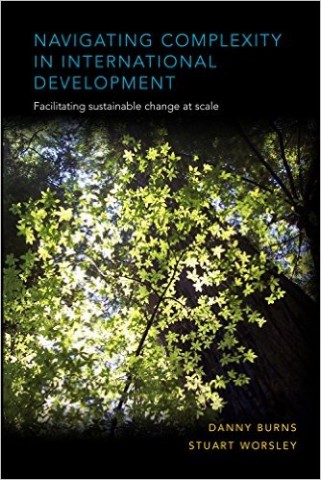Danny Burns and Stuart Worsley offer one of the best development studies reads of 2015 with their book "Navigating Complexity in International Development: Facilitating Sustainable Change at Scale." There are shelves of books that cover similar topics in development studies, with much repetition and little innovative thinking. Burns and Stuart offer just that by viewing the world and its systems as "complex, dynamic, and unpredictable" (p. xiv), and how international development needs to adjust to that. Particularly because development activities are "largely fixed, and tied firmly to preordained plans and change theories" (p. xiv). The result is that much of development action fails or is not sustainable. Their book offers practical examples about how this can change and offers methodological systems that can be employed in practice. A few thought provoking quotes:
The question is about how, not why or what:
- "…the poorest and most marginalized were more concerned with how development was delivered, than what development was delivered. They said that there were already schools, hospitals, justice services, loan schemes, and so on but they didn't get access to them because they faced social and institutional discrimination" (p. 3).
Power!
- "Inequality and injustice are constructed through power relations. By understanding how power works both generally and in specific contexts, it becomes possible to develop strategies for engaging with it, challenging it, and shifting it…people living in circumstances of extreme poverty and marginalization see the biggest impediment to equality and access to services as power relationships expressed as discriminatory social norms and institutional discrimination." (p. 151)
On tipping points:
- "A tipping point is where all the pressure is building and suddenly change happens. Tipping points describe the straw that breaks the camel's back; the dam that bursts. If we were to look at the evidence we would observe that when we put a straw on the camel's back nothing happens. This evidence would suggest that it is possible to put straws on camels' backs indefinitely with no impact. But later one straw changes everything. Change is not necessarily proportional to the extent of an intervention. Nothing may appear to happen at all – even for decades – and then everything seems to change all at once. This is a non-linear pattern of change." (p. 28)
As Thornton and I have written, Burns and Worsley raise concerns about target-based assessments, which includes the MDGs and the various ranking forms:
- "One of the difficulties of a target-based framework is that it creates systemic incentives for programme managers to focus on the 'low hanging fruit'. The target is most likely to be met if people who have simpler, less complex problems are engaged with, and as a result the poorest of the poor are mostly untouched by these initiatives. The system dynamics shape a set of incentives which in turn direct behavior." (p. 35)
On replication:
- "Sustainable change does not then come from the transfer of something that is working in one place to another place; rather it lies in the amplification of micro-level interactions. To nurture these we need (a) to ensure that there is diversity at a local level and that any inquiry encompasses the diversity that exists within the system and (b) our focus needs to be on the most local level of interactions." (p. 30)
Moving ahead:
- "Clothed in arguments of accountability and stewardship, the ever-increasing imposition of tight controls on development investment ensures that development programs will never deliver results where they are really needed. Successful development practice requires a fundamental change in thinking and behavior. It requires development investors and actors to navigate complexity through engagement with people, in ways that are responsive and emergent. This requires new levels of flexibility, a willingness to stop pushing top-down change agendas, and an acceptance that sustainable change within complex systems will result from good process rather than detailed plans." (p. 176)

